How lesbian rom-com ‘Kissing Jessica Stein’ became a surprise hit 20 years ago
- Oops!Something went wrong.Please try again later.
- Oops!Something went wrong.Please try again later.
- Oops!Something went wrong.Please try again later.
They didn’t know it right away, but when Heather Juergensen and Jennifer Westfeldt met at a New York theater retreat in the late ‘90s, it was kismet.
The two still unknown actors, who would go on to co-create and produce the 2002 film “Kissing Jessica Stein,” had been ruminating on similar ideas — namely, how terrible it was to date in your 20s, especially if you were dating men.
“It was this nice little workshop run by a theater in New York City, who took all their actors, directors, writers — everyone who wanted to go — up to the Catskills every summer,” Juergensen told TODAY, in honor of the film’s 20th anniversary. “It was encouraged to try something you hadn’t done. If you’d only acted, you were told to write or direct and vice versa.”
Juergensen had written a sketch that she asked Westfeldt to act in. But Westfeldt turned her down, having already signed on to too many of the retreat projects. As Juergensen describes it, “everyone wanted Jennifer.”
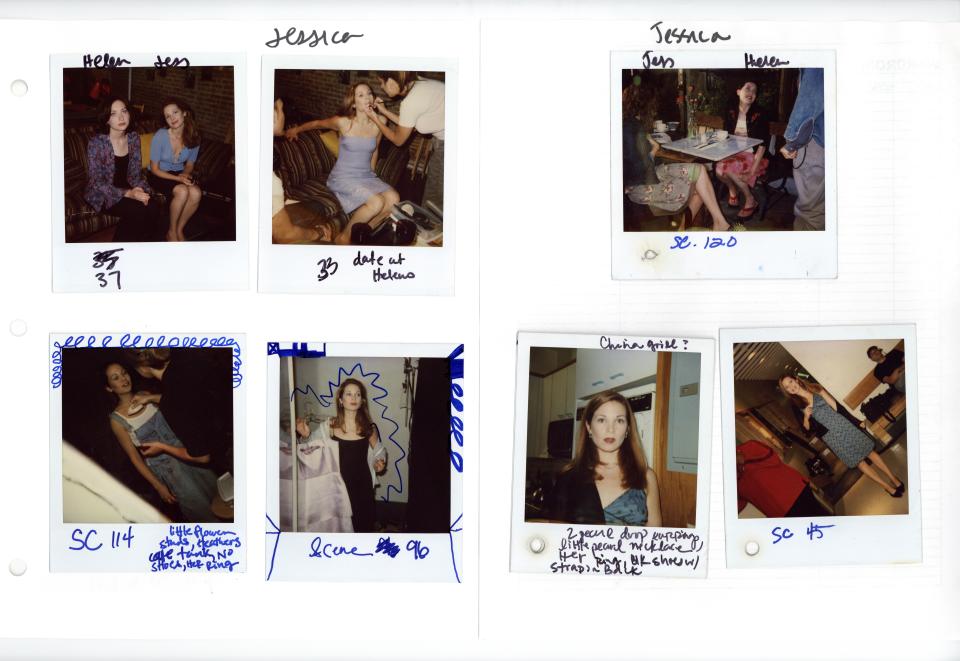
The two struck up a friendship anyway, quickly discovering their shared interest in the pains of pursuing modern love. “We both wrote a ‘nightmare date’ sketch and we clocked each other,” Westfeldt told TODAY. “One of us said, ‘We should rent a theater and put up a night of vignettes.’ Then, cut to a year later."
After a brief stint in Los Angeles, Westfeldt missed theater and New York so she moved back. Upon arriving, she called Heather, telling her, "‘Remember me from the summer? We said the thing about the theater? Let’s do it.”
When Juergensen got that call, she had just moved back in with her parents, unable to afford her co-op building’s recent rent hike. She was sitting on her childhood bed, feeling disheveled and contemplating the hardships of life as a creative, when she heard Westfeldt on the other line and immediately jumped at the opportunity.
“We got a group of actors together and we rented this little space in the basement of a church and we started writing,” Westfeldt said, describing the birth of the off-Broadway play that eventually became “Kissing Jessica Stein.” “It was meant to be this fun evening of vignettes and then, about halfway through, this narrative shape was forming. These two ladies were contemplating trying it with each other.”
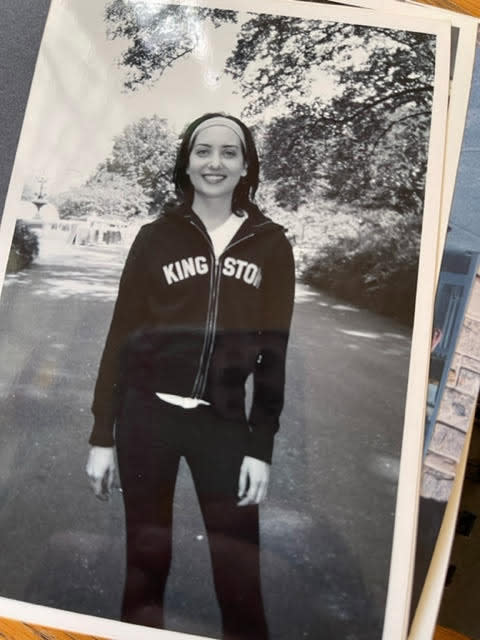
Although the play, “Lipshtick,” ran for just one weekend — and was viewed by an audience of primarily friends and family — it somehow attracted the attention of a number of studios, who saw potential for turning it into a movie.
Juergensen and Westfeldt, who radiate a natural chemistry both on and off screen, have a tendency to finish each other’s thoughts. When thinking about that moment, which began the yearslong process of bringing the film to fruition, Westfeldt said, nostalgically, “It was three nights, in a tiny theater…”
“But, as they say in film, it was high concept!” Juergensen interjected, punctuating the thought.
A neurotic copy editor, a free-spirited gallerist
That concept became “Kissing Jessica Stein,” a film about two women who explore a relationship with each other, after being exhausted by New York’s male dating pool. The titular character, played by Westfeldt, is a neurotic copy editor who is held back, romantically and artistically, by her perfectionist standards. That’s until a personal ad placed by a free-spirited gallerist named Helen, played by Juergensen, piques her interest. As the two fall for each other, they discover sapphic sex and the difficulties of coming out to friends and family. Though, the real challenge for Jessica is deciding whether or not her love for Helen goes beyond the platonic.
“We both have enjoyed some unbelievable, lifelong friendships with our girlfriends. I think it felt, to us, like not a big leap at all. That was really how it began: us exploring those incredible bonds with other women that feel so real and deep and intimate. And that, ‘what if?’” Westfeldt said.
Juergensen and Westfeldt had to shop around to find the right studio to bring this idea to life, and one that would let them star as the leads. Their script was ultimately optioned by a smaller studio, Gramercy Pictures, with the understanding that they would play Jessica and Helen.
“It was all a pretty dreamy moment. We wrote this little play, and I was doing my first sitcom — that was the first time I’d ever been on camera, really — so it still felt like an enormous leap and an incredible opportunity,” Westfeldt said.
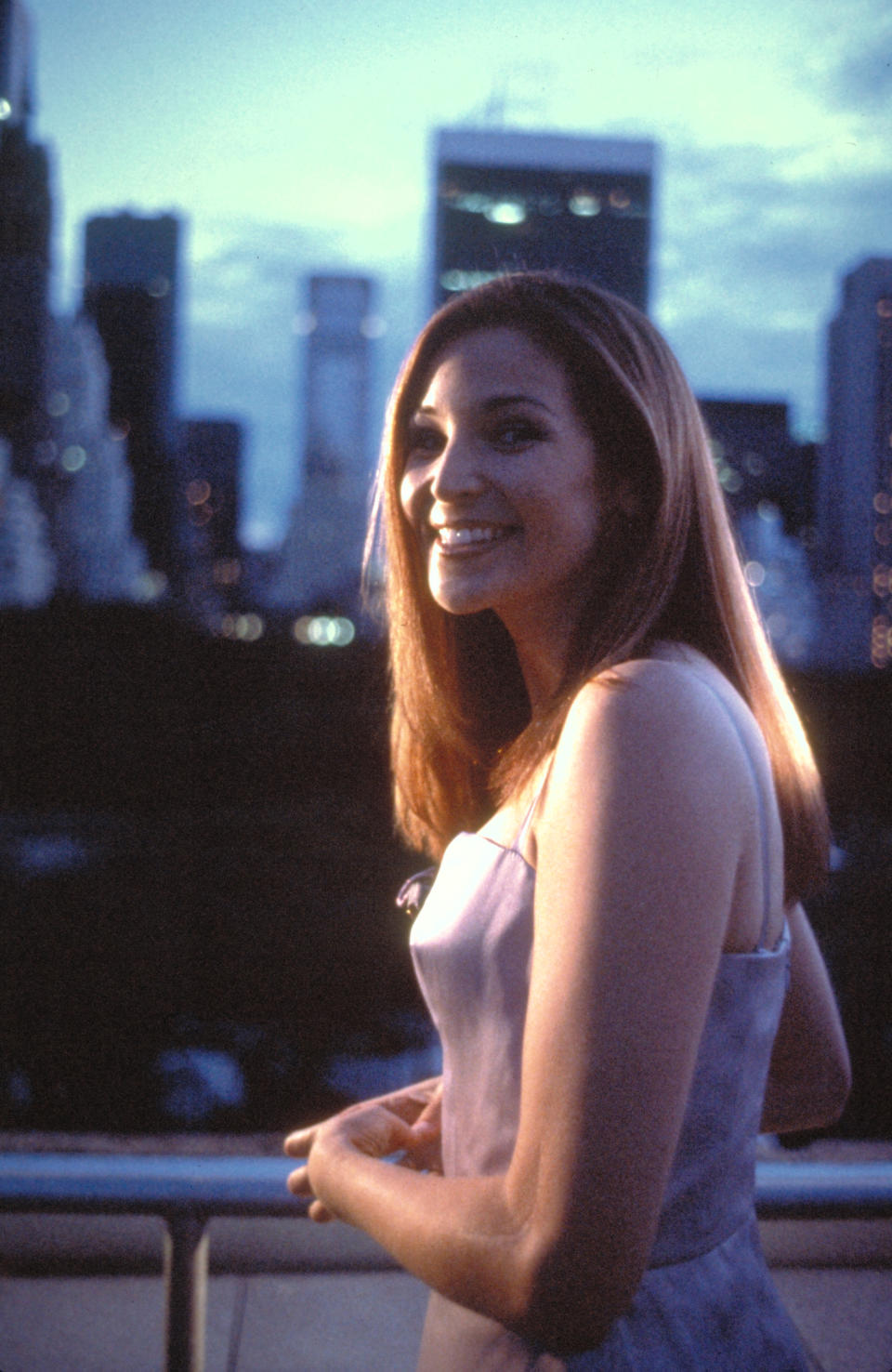
But after two years of working on the script with the studio, and still no end in sight, reality set in. Fearing that they could languish in development limbo for several more years, Juergensen and Westfeldt bought back the rights to the film and began the journey of making it independently, which meant securing funding and a team that was fully on board with their vision.
At first, they sold shares, valued at $2,500 each, to anyone who could buy one — or even a half of one. Then they found an angel investor — Brad Zions — who fronted a large portion of the film’s modest budget. By that time, they had signed on friends in major behind-the-scenes roles, including Eden Wurmfeld, as producer, and Lawrence Sher, as cinematographer.
“We just started collecting people from our extended circle. You were in 500% or not at all, and that was how we put it together,” Westfeldt said.
“It’s hard making a movie independently. But the positive side is that the only people who come into that party are the people you invite. We were able to curate a group of people that were, as Jen says, ‘all in’ and really got the material — really got us — and were very committed to the vision,” Juergensen assented.
This inner-circle strategy eventually brought them to their choice of director: Wurmfeld’s brother, Charles Herman-Wurmfeld.
After approaching and being turned down by more experienced directors, Juergensen and Westfeldt settled on the enthusiastic, green director, who had recently moved to LA to pursue a career in film after working in theater in San Francisco. When Herman-Wurmfeld came across the script, he was crashing on his sister’s couch, working a job at a cafe, and making his way around the car-polluted city via bicycle.
Apple boxes instead of trailers
Unlike the rest of the film’s major players, Herman-Wurmfeld was already acquainted with queer storytelling and was uniquely interested in directing a sapphic romance. He particularly connected to the conflict that arises as Jessica is unable to match Helen’s enthusiasm for intimacy and for being a card-carrying queer.

“I felt very aligned with their story as someone who had come out with their own best friend who was straight, and really realized their gayness through the prism of someone else’s straightness. It was just particularly vibrant and true to me,” Herman-Wurmfeld told TODAY.
But without much film experience under his belt, getting brought on as director felt like a long shot, until his patience paid off. “I chased it. I wouldn’t stop making myself available to help in any way possible, and I really meant that,” Herman-Wurmfeld said.
“I was attempting to be a director, but I was ready to step in on this project anywhere that they would have had me. It turned out that enough people said ‘no’ to their offers that they ended up saying, ‘We just need a good director who loves our story. And it doesn’t matter if they’re well-known, because we already have our money together,’” he said, describing how it became less and less financially necessary for the creators to bring on a big name.
Once Juergensen and Westfeldt made their choice of director, the cast was rounded out with a few, more well-known faces, including Scott Cohen, who plays Jessica’s former boyfriend and current boss Josh, and Tovah Feldshuh, who plays Jessica’s somewhat overbearing Jewish mother.
While Feldshuh had been in mind from the beginning, Cohen, who was well-known at the time for his role in the miniseries “The 10th Kingdom,” ended up being a surprise asset.
“He wasn’t our first choice. Like many things in indie filmmaking, you think you want one thing and then the world (shows) you what you can have. And then, you go, ‘This was what I really needed all along,’” Herman-Wurmfeld said of the actor, who was ultimately cast as Jessica’s charming and infuriating admirer. “Scott stepped into that part and became a foil for our affection for this — a little bit looney — character.”
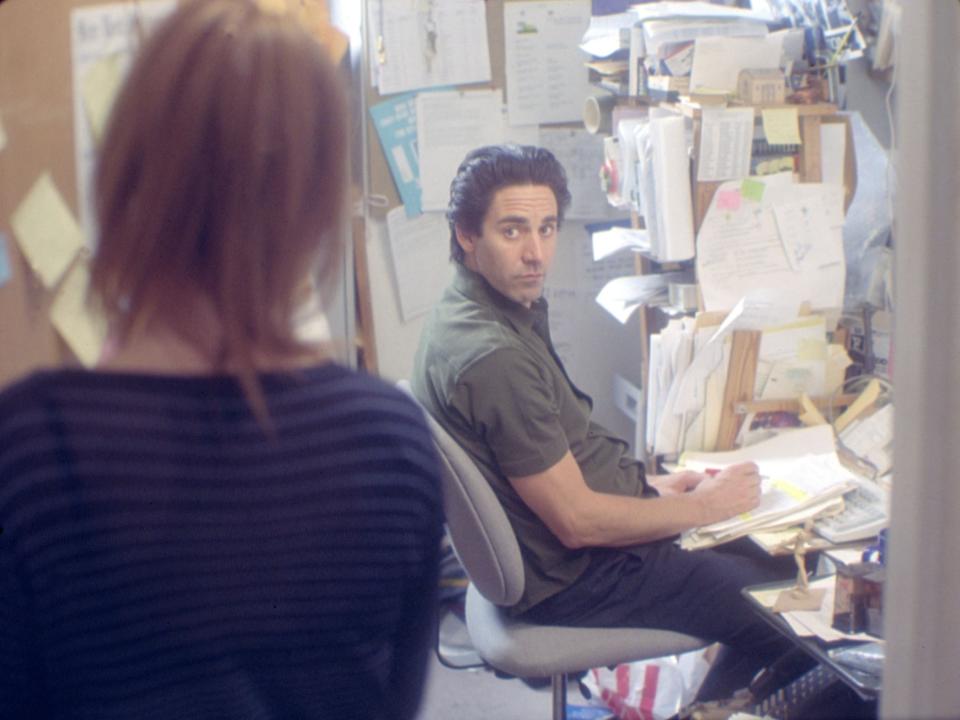
Although Cohen told TODAY that he didn’t realize the impact that “Kissing Jessica Stein” would make, he was confident in the creators, his castmates and those working behind the camera: “The reason that indie films feel like indie films is because, usually, there’s somebody so inexperienced that they don’t know what they’re doing. But this did not feel like that.”
Of course, there were still tangible signs that they were, indeed, working on an indie. (Cohen mentions sitting on an apple box on the street between scenes, in lieu of a trailer or somewhere more formal to wait.) But what he mostly remembers is that the film and his character felt true to life — flaws, missed opportunities and all.
“What’s wonderful about it is that there’s an arc to his character. You get to see where he starts and what he becomes and what he’s missing,” Cohen said.
What he’s missing, it turns out, is Jessica. But, just when he realizes it, she’s worked up the courage to be out about her relationship with Helen.
‘That scene really changed my life’
There are a few scenes toward the end of “Kissing Jessica Stein” that stand out from the otherwise lighthearted, sometimes slapstick film. One of them is the scene in which Josh digests both his feelings and the relationship he’s been blind to. And the other is Jessica’s heart to heart with her mother, Judy.
In the emotional scene starring Feldshuh and Westfeldt, the mother offers an olive branch to her daughter, who still can’t bring herself to fully embrace her relationship, despite the fact that she’s falling in love. Sensing Jessica is afraid to put her feelings into words, Judy breaks the silence and brings up Helen, uttering a simple but meaning-laden compliment about her being a nice girl.
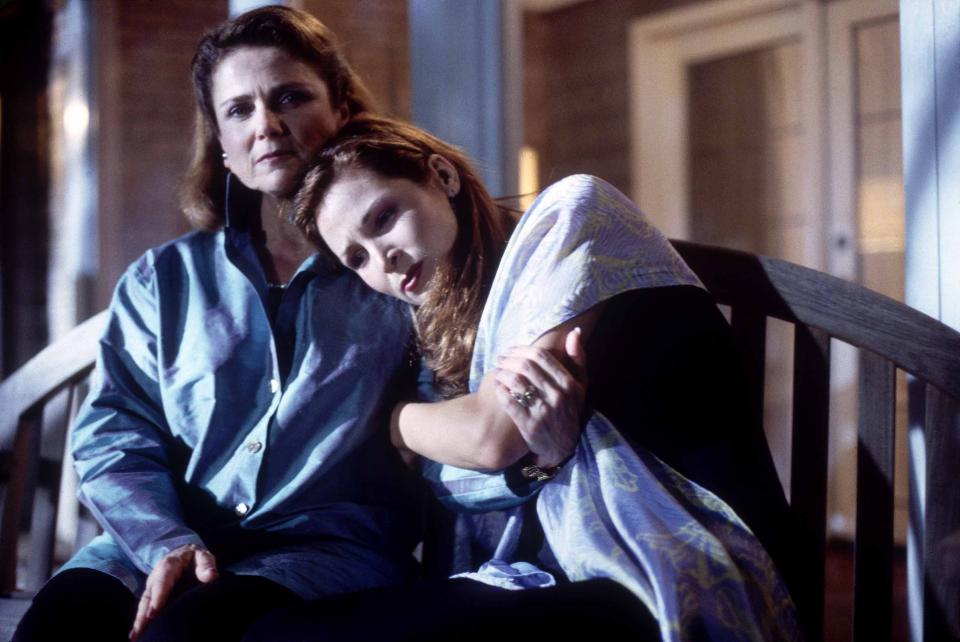
“Before she says, ‘I think she’s a very nice girl,’ she takes this moment to swallow everything that she thought before. And becomes a time when you see this character having this human experience of putting the present into the past and stepping into a new place,” Herman-Wurmfeld said, repeating how Feldshuh had described the scene to the rest of them, just recently.
While the turmoil of that moment is perhaps dated by modern standards — in which queer love and identity is openly celebrated on screen — it struck a chord with many LGBTQ viewers at the time. It was an era, after all, when the closet was still very much a normal place to stay.
“Strangers come up to me on the plane, or in line for something, and say, ‘That scene really changed my life’ or ‘That was the scene I showed my parents,’” Westfeldt said, describing experiences both she and Juergensen still have. “For people who didn’t have the luxury of coming from a supportive family or a supportive, liberal place, it’s been a touchstone.
“That’s probably the proudest I’ve ever been as an artist, to have anything to do with anybody being able to come out.”
A love letter to queer people
While that scene has been remembered favorably by LGBTQ audiences, “Kissing Jessica Stein” was generally divisive when it was released. While it’s hardly the only example from the era, the film’s premise — in which two women casually explore a same-sex relationship as a last resort — offended many queer viewers. On the other hand, there were many others who were grateful for the representation at a time when mainstream romances were strictly heterosexual.
Juergensen and Westfeldt were not immune to these criticisms and even changed the film’s ending, which involved Jessica going over to Josh’s house, presumably to follow up on his romantic confession. The pair reshot the final scenes — which were read as being both symptomatic of and sympathetic to the film’s straight roots — so that Jessica runs into Josh, under more ambiguous circumstances, but ultimately ends up at a friendly lunch with Helen, who has found her way into a much healthier, sex-positive relationship.

“Our earlier ending felt a little quick and truncated, and like Jessica hadn’t evolved in a way that people were hoping for or expecting,” Juergensen said, looking back. “We felt like we needed both women to be more fully who they were from the relationship.”
Other than the ending, Westfeldt and Juergensen said they wouldn’t change a thing.
“There was a breathlessness to everything about this shoot — and everybody’s being in it together — that I don’t think you could capture if you had twice the budget or everything was labored,” Westfeldt said. “There was just a spirit and a spontaneity to it, because it was us against the world.”
“I think what people respond to in the film is the energy of it. And that came from all those things that you can’t buy. They just are; they come with the urgency,” Juergensen added.
And their director agrees. In fact, he’s hoping that with the film — which he describes as “a love letter to queer people” that hasn’t always been understood that way — being rereleased in the context of LGBTQ Pride Month this June, it’ll finally get its fair shake from queer audiences.
“This is why I became a filmmaker, because I really believe that the stories we tell ourselves are liberating,” Herman-Wurmfeld said. “Now, you talk to kids and they’re freely expressing their gender fluidity. And that ease, I hope, has come from stories like this. We’re not alone, but the story has been significant for many people.”
“It was a real watershed moment in my career as an artist. And now, 20 years later, that we’re still talking about it, that’s a dream come true — that there’s still relevance to something that we made so long ago."
To celebrate LGBTQ pride, TODAY is sharing this community’s history, pain, joy and what’s next for the movement. We will be publishing personal essays, stories, videos and special features throughout the entire month of June.

